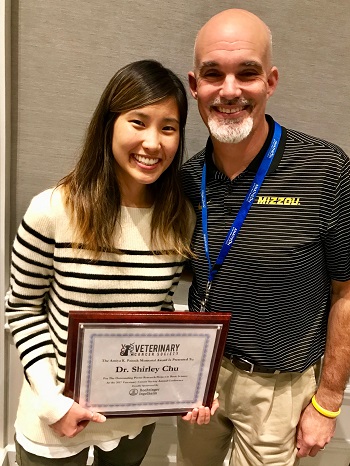Shirley Chu, DVM

|
| Dr. Shirley Chu and her mentor Dr. Jeff Bryan holding the Amiya K. Patnaik Memorial Award For The Outstanding Poster Research Project in Basic Science at the 2017 Veterinary Cancer Society Annual Conference |
Dr. Shirley Chu is a medical oncology resident and PhD student in the Comparative Oncology and Epigenetics laboratory of Dr. Jeffrey Bryan at the University of Missouri. The focus of her research is applying massively parallel sequencing (MPS) or next generation sequencing techniques to determine the genetic makeup of cancer. MPS will help us understand breed/genetic predisposition, environmental causes, classification, genetic evolution and drug targets, in canine and feline cancers.
Lymphoma is one of the most common cancers in people and in dogs, and Diffuse Large B cell Lymphoma (DLBCL) is the most common aggressive lymphoma in these species. Dr. Chu’s project is to further understand the effects of DNA methylation on cancer, using epigenetics, the study of potentially reversible changes to nuclear material that ultimately determine DNA expression. DNA methylation is the most permanent epigenetic mark and has been the most widely studied. DLBCL is the subject of this study to elucidate the first methylome in the canine species (specifically in Golden Retrievers). MIRA-seq (methylated CpG island recovery assay) is an enrichment technique that was used to collect genome wide DNA methylation information. The methylomes will be analyzed to determine if a distinct fingerprint can be seen in DLBCL in Golden Retrievers, if this fingerprint models human DLBCL, and if a diagnostic panel can be produced for early diagnosis and aid in prognostication.
Other future projects to understand the genetic landscape of cancer in dogs include a parallel whole genome, exome (allows increased sequencing coverage of the part of the genome that contains known genes) and RNA-sequencing of DLBCL for the identification of actionable somatic mutations, biomarkers of minimal residual disease, tumor subtyping, tumor heterogeneity, structural variants and breed-related susceptibility. The bioinformatics pipeline that will be developed for these projects can then be readily applied to other canine cancers.
Help Future Generations of Dogs
Participate in canine health research by providing samples or by enrolling in a clinical trial. Samples are needed from healthy dogs and dogs affected by specific diseases.



